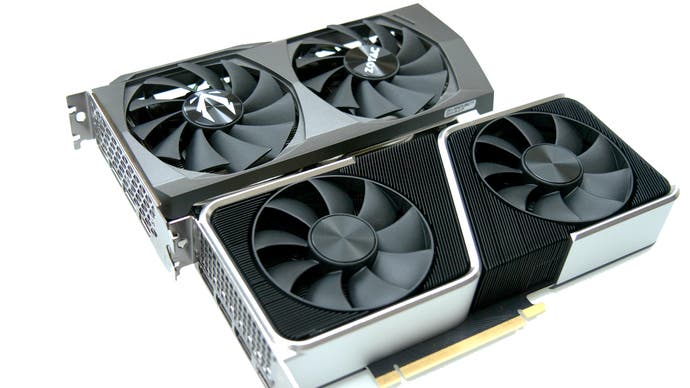Nvidia RTX 3060 review: the Digital Foundry verdict
A convincing upgrade, but the 3060 Ti is better value.
So where does all this leave us? In many respects, the RTX 3060 is typical of Nvidia's past Ampere cards. It offers a convincing argument to GTX 10-series owners that now is a great time to upgrade, with frame-rates nearly doubling from the GTX 1070 to the RTX 3060 in many titles. Compared to last-gen models, the 3060 comfortably outperforms the RTX 2070 in almost every game and resolution we tested, occasionally eclipsing even the 2070 Super that debuted in mid-2019 for $500. It does particularly well in ray tracing titles, and there's often the option of DLSS to increase frame-rates even further.
The other features baked in, like HDMI 2.1 support and AV1 decoding, are forward-looking additions that should help the 3060 remain relevant for longer. The 12GB of GDDR6 VRAM is also a nice nod towards those that want to see a healthy VRAM allocation for future-proofing, although I suspect that a hypothetical 6GB model at a $300 price point might make even more sense given how infrequently memory capacity limits performance before other factors like compute or memory speed. Still, with middle-of-the-road options like 8GB off the table thanks to the shape of its 192-bit memory bus, it's not unreasonable for Nvidia to have gone for the safer 12GB option.
The inclusion of Resizeable BAR is also brilliant, especially for a card that targets 1080p and 1440p gaming, as our testing shows small but significant gains at these resolutions - up to 17 per cent in Battlefield 5 at 1080p, with more moderate three and five per cent gains in Metro Exodus and Watch Dogs Legion. While support requires specific motherboard and processor combinations at present, upcoming motherboards for both Intel and AMD platforms look set to include it as standard going forward. Likewise, the small number of whitelisted games should also expand, again potentially magnifying the import of ReBAR support.

While there's a lot to like here, the RTX 3060 is undoubtedly not as strong a value as the RTX 3060 Ti. That card costs around 20 per cent more ($400 vs $330), yet provides a significant boost to frame-rates - especially at 1440p and 2160p, where the Ti is often 26 to 36 per cent faster. For 1080p gaming, the RTX 3060 is sufficient, but in a world where graphics cards are freely available at their recommended retail price, I'd suggest that people with a bit of flexibility in their budget consider the Ti instead, even if it means accepting a smaller hard drive or less RAM to start out.
Of course, right now we're far from a world where graphics cards are available at any kind of reasonable price. Nvidia's recent announcement that the 3060 will be limited to half-speed cryptomining may have a small positive impact on retail availability of the new card, but it's hard to imagine that the card will remain in stock at its RRP any time soon - especially as there's no Founders Edition model this time around. (Still, we're doing our best to round up where to buy the RTX 3060 here. )
For what it's worth, the Zotac Twin Edge model we were sent for testing performed admirably. The twin-fan design is exceptionally compact, and requires just a single eight-pin power input, making it easy to include even in compact or budget-constrained builds with a small 450W power supply. Fan noise was relatively low, and build quality was good despite a largely plastic shroud. The amount of performance that can be wrung out of such a modest design without excess heat or noise is remarkable, and speaks to the design chops of both Nvidia's board partners and the new chips themselves.
Now, the only thing left to do is see how things shake out - both in terms of retail availability and potential competitors from AMD, who have yet to release any cards below the $580/£530 RX 6800 but are set to make announcements in early March. With luck, as we enter the spring and summer months, it'll be possible for gamers to pick up a very strong 1080p graphics card from either team at a reasonable price. Wouldn't that be nice?
Nvidia GeForce RTX 3060 Analysis
- Introduction and Hardware
- Doom Eternal, Control, Borderlands 3, Shadow of the Tomb Raider - Game Benchmarks Part 1
- Death Stranding, Far Cry 5, Hitman 2, Assassin's Creed Odyssey - Game Benchmarks Part 2
- Metro Exodus, Dirt Rally 2, Assassin's Creed Unity - Game Benchmarks Part 3
- RTX Game Benchmarks - Control, Metro Exodus, Battlefield 5
- Resizeable BAR Testing - Watch Dogs Legion, Battlefield 5, Metro Exodus
- Nvidia GeForce RTX 3060 - the Digital Foundry verdict [This Page]








